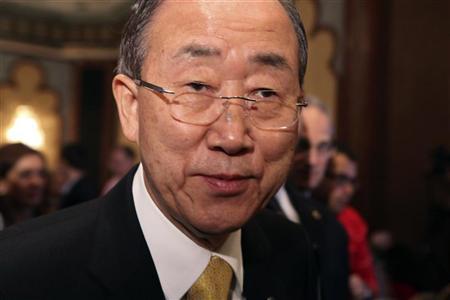
Thursday, November 29, 2012
By Louis Charbonneau and Michelle Nichols

United Nations (U.N.) Secretary-General Ban Ki-moon leaves after a joint news conference with Arab League Secretary-General Nabil Elaraby following their meeting to discuss the situation in Gaza, in Cairo November 20, 2012. REUTERS/Asmaa Waguih
Diplomats and U.N. officials say that peace enforcement missions allow the use of lethal force in serious combat situations, while peacekeeping operations are intended to support and monitor an already existing ceasefire.
The last U.N.-led peace enforcement mission approved by the 15-nation Security Council was in Somalia in the early 1990s when 18 U.S. troops were killed in the "Black Hawk Down" incident, an event that led to U.S. withdrawal of combat troops from U.N.-commanded peacekeeping operations.
Ban's cautiously worded recommendation made clear that the world body is still wary of getting back into the peace-enforcement business. He said that the council should ensure that political, human rights, training and operational benchmarks be met before any military offensive commences.
As planning for the mission continues, Ban said the 15-nation council could "authorize member states of the African Union to establish AFISMA for an initial period of one year, comprising 3,300 (international) personnel to take all necessary measures to assist the Malian authorities."
AFISMA is the proposed acronym for the U.N.-mandated African force in Mali.
"Fundamental questions on how the force would be led, sustained, trained, equipped and financed remain unanswered," Ban said. "Plans for both the international force and the Malian security and defense forces need to be developed further."
One Security Council diplomat was furious at Ban's recommendation against granting the AU request for U.N. funding for the operation, which U.N. diplomats estimate will cost $300 million to $500 million.
"I think it's quite insulting to a number of countries, in particular to some AU countries," a Security Council diplomat said on condition of anonymity.
Another diplomat said the council was under no obligation to follow Ban's recommendations, although he added that it might be hard to secure a majority in favor of overriding them in order to provide U.N. funding to an AU operation in Mali.
Ban suggested that the funding for the initial military combat operations could be through "voluntary or bilateral contributions" - which diplomats said meant European Union member states would be asked to cover costs.
"TARGETED MILITARY OPERATIONS"
The fall of Mali's north to Islamists, including AQIM, al Qaeda's North African wing, has carved out a safe haven for militants and international organized crime, U.N. officials say, stirring fears of attacks in West Africa and in Europe.
African leaders are seeking a U.N. mandate to send a mainly West African force to rebuild Mali's army and back operations to win back the occupied desert zones.
Ban expressed reservations about the United Nations' capacity to take on "terrorists and affiliated groups."
"Targeted military operations may be required to dislodge them from northern Mali, in which case member states may decide to directly support the military activity needed to combat these groups," Ban said.
He added that once major combat operations the council could consider authorizing an actual U.N. peacekeeping mission.
Council diplomats said that could take the form of special forces units from individual U.N. member states.
Diplomats say they want to adopt a resolution authorizing the mission before the end of the year.
African officials estimate there are 2,500-3,000 core fighters amongst the Islamists coming from Africa, Europe and Asia. The U.S. estimates the hard-core contingent of Islamists much lower at between 800 and 1,200. The conflict has forced 400,000 Malians to flee their homes.
Regional powerhouse Algeria says it prefers a negotiated solution.
U.N. diplomats and officials say the Algerians are concerned that a military offensive against the Islamists in northern Mali could push them across the border into Algeria, though Algiers has indicated its cautious support for the undertaking.
Last week former Italian Prime Minister Romano Prodi, the U.N. envoy to the troubled Sahel region, which includes Mali, ruled out imminent action, saying it would not be possible before September or October next year.
The European Union is planning to send 200 troops to Mali to help with training. But like the United States and former colonial power France, which is the keenest of Western nations for military action, Brussels has ruled out a combat role.
West Africa regional bloc ECOWAS agreed this month to commit the 3,300 troops for the international force. The troops would mostly come from Nigeria, Niger and Burkina Faso, but other West African countries and two or three non-African states may also contribute, said Ivory Coast President Alassane Outtara.
Once viewed as an example of progress towards democracy in Africa, Mali fell into chaos after a coup in March that toppled the president and left a power vacuum that was quickly exploited by rebels to take over the north.
(Editing by Stacey Joyce and Eric Walsh)